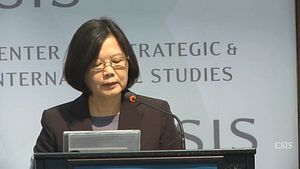Tsai Ing-wen, the chair of Taiwan’s Democratic Progressive Party (DPP) as well as its nominee for the 2016 presidential election, is on a 12-day, six-city tour of the United States. From June 1-5, Tsai is in Washington, D.C., meeting with officials and scholars to discuss her vision for the future of Taiwan. Given that Tsai is the favorite to become Taiwan’s next president (the ruling Chinese Nationalist Party, or KMT, hasn’t even decided on a candidate yet), Tsai’s platform is being closely scrutinized.
Much of Tsai’s U.S. tour involved speeches or comments focused on Taiwan’s foreign policy – not surprising, given the foreign audience for these remarks. In particular, Tsai wanted to convince U.S. officials that a Taiwan under DPP rule will be, in her words, “a reliable partner of the U.S. in ensuring peace and stability in the region.”
From the U.S. perspective, that involves ensuring a peaceful relationship with mainland China. In 2011, officials from the Obama administration openly told Financial Times that they were concerned a Tsai administration would threaten stability in the region. “She left us with distinct doubts about whether she is both willing and able to continue the stability in cross-Strait relations the region has enjoyed in recent years,” an anonymous official said after meeting with Tsai.
Tsai will look to avoid such unpleasantness this time around. In a question and answer session after a speech at the Center for Strategic and International Studies, Tsai said her campaign has “better communication” this time, both with the Taiwanese public and with the United States, “so that our intentions will not be distorted or misunderstood.” At a banquet Wednesday night, Tsai told attendees (including a number of U.S. Congress members) that her discussions in the U.S. were “frank and open.”
For observers in the U.S. government, the crucial question remains whether Tsai will keep cross-strait relations on an even keel. It’s no accident that Tsai’s main talking point on the cross-strait issue is her pledge to maintain the “status quo” — in other words, promising no dramatic changes. In an op-ed for the Wall Street Journal, Tsai pledged that “a more consistent and sustainable relationship with China will be a core goal of my administration.”
As part of this, Tsai promised in her CSIS speech to “treasure and secure the accumulated outcomes of more than twenty years of negotiations and exchanges” between both sides of the strait. However, some of the agreements negotiated under current President Ma Ying-jeou might not survive. Tsai pledged to create legislation (the Cross-Strait Agreement Oversight Bill) “to establish a comprehensive set of rules for overseeing the cross-strait exchanges and negotiations.” Such a bill, designed to create more transparency and legislative control over cross-strait interactions, was a key demand of the Sunflower protests of March 2014.
As for her commitment to maintain the “status quo,” Tsai acknowledged that different players might have different understandings of the term. But she noted that “maintaining a peaceful and stable relationship across the Taiwan Strait serves the interests of everybody. And whatever the interpretation of that term [the status quo], this should be a part of that interpretation.”
Tsai offered her own definition of the status quo during her speech at a welcome banquet hosted by Ed Royce (R-CA), the chairman of the House Foreign Affairs Committee: “Protecting the ‘status quo’, as the people of Taiwan define it, namely a democratic way of life, respect for human rights, and the rule of law, will be the principal objective of my cross-strait agenda, one which reflects the expectations of the Taiwanese people.”
Tsai has been cautious in describing her cross-strait agenda, caught between a need not to upset those in her party who lean toward Taiwan independence and the need to ensure cross-strait relations don’t drift toward conflict. This caution led her to avoid answering several questions from the audience asking for clarification on her position on Taiwan independence and the 1992 Consensus, which Beijing insists is the baseline for any cross-strait interactions. KMT has criticized Tsai for this ambiguity, calling her promise to maintain the status quo vague.
As for Taiwan’s relationship with the U.S., Tsai pledged expanded cooperation on all front, from defense and security issues to economics. In her Wall Street Journal piece, Tsai called the United States “Taiwan’s most important strategic partner”
On defense, Tsai said “It is important that mil-to-mil relations with the U.S. continue to intensify,” noting not only defense sales but joint training and exercises as avenues for cooperation. She also spoke of enhancing U.S.-Taiwan cooperation against non-traditional security threats, including cyber issues and terrorism.
Economically, Tsai envisioned joint cooperation on “on the next generation infrastructure for Internet of Things (IoT), cloud, big data, and ICT-based new industries,” part of her overall focus on shifting Taiwan towards an innovation-based economy. Tsia also voiced her support for Taiwan joining regional trade agreements, especially the Trans-Pacific Partnership. “There is an urgent need for Taiwan to participate in the Trans Pacific Partnership (TPP), at least to be included in the second round of negotiations,” Tsai said.

































